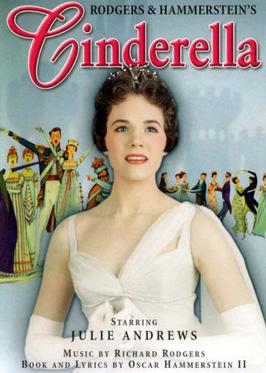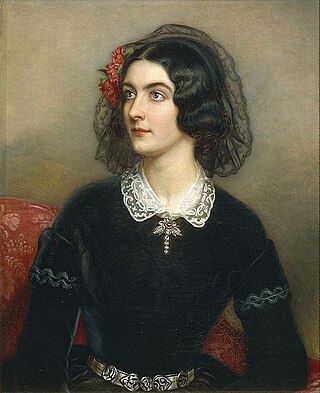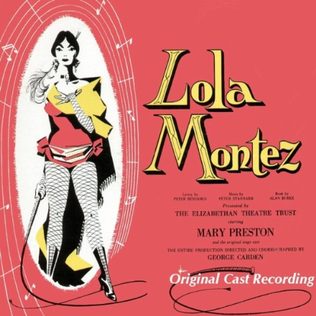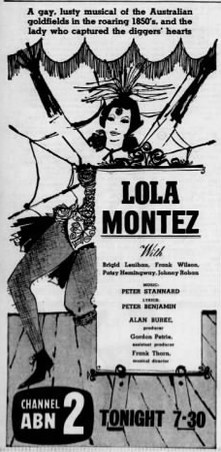Related Research Articles

Eliza Rosanna Gilbert, Countess of Landsfeld, better known by the stage name Lola Montez, was an Irish dancer and actress who became famous as a Spanish dancer, courtesan, and mistress of King Ludwig I of Bavaria, who made her Gräfin von Landsfeld. At the start of the Revolutions of 1848 in the German states, she was forced to flee. She proceeded to the United States via Austria, Switzerland, France and London, to return to her work as an entertainer and lecturer.

Rodgers and Hammerstein's Cinderella is a musical written for television, but later played on stage, with music by Richard Rodgers and a book and lyrics by Oscar Hammerstein II. It is based upon the fairy tale Cinderella, particularly the French version Cendrillon, ou la petite pantoufle de verre, by Charles Perrault. The story concerns a young woman forced into a life of servitude by her cruel stepmother and self-centered stepsisters, who dreams of a better life. With the help of her fairy godmother, Cinderella is transformed into a princess and finds her prince.

Copacabana, also known as Barry Manilow's Copacabana, is a 1994 stage musical with music by Barry Manilow, lyrics by Bruce Sussman and Jack Feldman, and book by Manilow, Sussman and Feldman. The show had its roots in an hour-long stage show, Barry Manilow Presents Copacabana, which played in Atlantic City in 1990 and 1991. The stage show was based on the 1985 musical TV film of the same name, in turn based on Manilow's 1978 hit song of the same title, which was co-written by Manilow, Sussman and Feldman. The full-length musical, which added a present-day framing device and many additional songs, premiered in the United Kingdom in 1994 and later toured the United States. A cast album of the musical was released in 1994, titled Copacabana: Original London Cast Recording.

Martine Carol was a French film actress. She frequently was cast as an elegant blonde seductress. During the late 1940s and early 1950s, she was the leading sex symbol and a top box-office draw of French cinema, and she was considered a French version of America's Marilyn Monroe. One of her more famous roles was as the title character in Lola Montès (1955), directed by Max Ophüls, in a role that required dark hair. However, by the late 1950s, roles for Carol had become fewer, partly because of the introduction of Brigitte Bardot.

"Whatever Lola Wants" is a popular song, sometimes rendered as "Whatever Lola Wants, Lola Gets". The music and words were written by Richard Adler and Jerry Ross for the 1955 musical play Damn Yankees. The song is sung to Joe Hardy by Lola, the Devil's assistant, a part originated by Gwen Verdon, who reprised the role in the film. The saying was inspired by Lola Montez, an Irish-born "Spanish dancer" and mistress of King Ludwig I of Bavaria, who later became a San Francisco gold rush vamp.
Sally Ann Boyden is an Australian singer, songwriter, children’s television program writer and actress. Boyden commenced her performance career, at the age of seven, on TV series, Young Talent Time, in 1973. After leaving in 1976, she released her debut solo album, The Littlest Australian, and appeared on United States TV's The Waltons to begin her international acting career.

Her Majesty's Theatre is a 1,700-seat theatre in Melbourne's East End Theatre District, Australia. Built in 1886, it is located at 219 Exhibition Street, Melbourne. It is classified by the National Trust of Australia and is listed on the Victorian Heritage Register.
Leila Antoinette Sterling Mackinlay was a British writer of romance novels from 1930 to 1979 as Leila S. Mackinlay or Leila Mackinlay and also under the pseudonym Brenda Grey. Some of her novels are based on real people like Madame Vestris, Lola Montez or Jane Elizabeth Digby; she also wrote Musical Productions, a musical book. She was the daughter of the musician and writer Malcolm Sterling Mackinlay and granddaughter of the vocalist Antoinette Sterling.
Campbell Copelin was an English actor, who moved to Australia in the 1920s and worked extensively in film, theatre, radio and television. He had a notable association with J.C. Williamson Ltd and frequently collaborated with F. W. Thring and Frank Harvey. He often played villains.

The Young Victoria is an Australian television film of 1963 which aired on ABC on 27 March 1963. Based on the play Victoria Regina, it is a 60-minute drama about the courtship and marriage of Queen Victoria to Prince Albert. It stars Lola Brooks as Victoria and Ric Hutton as Albert.
The Concord of Sweet Sounds is a 1963 Australian television play starring Stuart Wagstaff, directed by Henri Safran and written by Patricia Hooker. Henry Gilbert played a musical genius. Australian TV drama was relatively rare at the time.

"Pardon Miss Westcott" is a 1959 Australian TV play by the Seven Network as part of drama anthology series Shell Presents. It was a musical set in colonial Australia and was broadcast live. It was Australia's first television musical comedy. "Pardon Miss Westcott" aired on 12 December 1959 in Sydney and on 19 December 1959 in Melbourne.

Lola Montez is a 1958 Australian musical. It was written by Alan Burke, Peter Stannard, and Peter Benjamin and focuses on four days of Lola Montez visiting the Ballarat Goldfields.
Alan Burke was an Australian writer and film director and producer. His credits include the musical Lola Montez.
The First Joanna is a 1943 play by Dorothy Blewett that was adapted for radio and television.
The Highwayman is an Australian musical comedy with book, music and lyrics by Edmond Samuels. Set in Bendigo during the Gold Rush in the 1860s, the story concerns the love of an innkeeper's daughter for a highwayman.
Bruce Alaric Barry was an Australian stage, television and film actor, and singer.

Lola Montez was a 1962 Australian TV play which was based on the musical of the same name.
Michael Cole was an Australian singer and actor. He appeared in a number of Australian musicals.
Hermia Sappho Boyd (1931–2000) was an Australian artist, writer, and a member of the Boyd artistic dynasty.
References
- ↑ "TV Guide". The Age. 4 October 1965. p. 12.
- ↑ "TV Guide". Sydney Morning Herald. 27 September 1965. p. 13.
- 1 2 "Untitled". The Age. 30 September 1965. p. 21.
- 1 2 "Oo-la-la! It's Lola on TV". TV Times. 20 October 1965. p. 10.
- ↑ Vagg, Stephen (February 12, 2022). "Forgotten Australian Television Plays: Lola Montez". Filmink.
- ↑ "Edmond Samuels papers, 1919-1964". State Library of New South Wales.